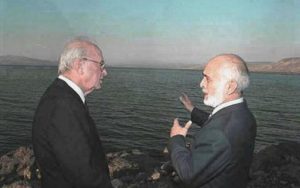Dismantling ‘Isle of Peace,’ Jordan chooses hardliners over Israel ties

The power plant at the Isle of Peace
Raoul Wootliff and Adam Rasgon write in Times of Israel, “When Israel and Jordan signed a peace treaty in 1994, special arrangements were made for parcels of land near Naharayim in the north and Tzofar in the southern Arava desert. Although the land had belonged to Israel for decades and had been farmed by Israeli settlers, under the treaty, it was transferred to Jordan.”
“Then, in a spirit of cooperation, it was leased back to Israel, so that farmers could continue cultivating their fields. From that time on, Israeli visitors were warmly welcomed to the Israeli enclaves inside the Kingdom of Jordan (which hold the remains of a hydroelectric power station build by Jews in 1921), and the amicable agreement was tangible proof that peaceful coexistence could be a reality.”…

Prime Minister Yitzhak Rabin, left, and King Hussein shortly after signing the Israel Jordan Peace Treaty in 1994
“Last year, the two countries were embroiled in a diplomatic standoff, following the shooting deaths of two Jordanians in July 2017, by an Israeli security guard, Ziv Moyal, who Israel said opened fire in self-defense after one of the men tried to stab him. They only reached an agreement to end the diplomatic fight in January, when a Jordanian government spokesperson said he had received from Israel an “official memorandum” apologizing for the deaths of the two Jordanians, as well as for the killing of a Jordanian judge in a separate incident in 2014. But, while Israeli officials had reportedly been aware of Jordanian murmurings to cancel the land agreement, Abdullah’s announcement — and particularly the sharp tone of his statement — came as something of a surprise.” (more…)
